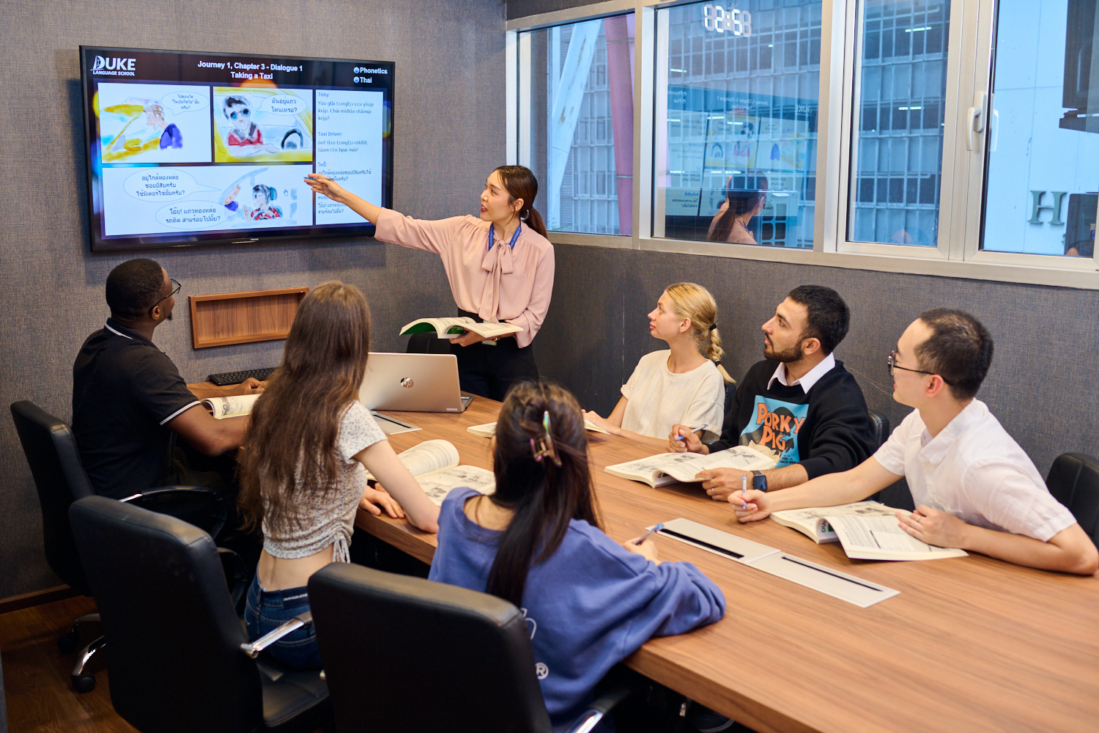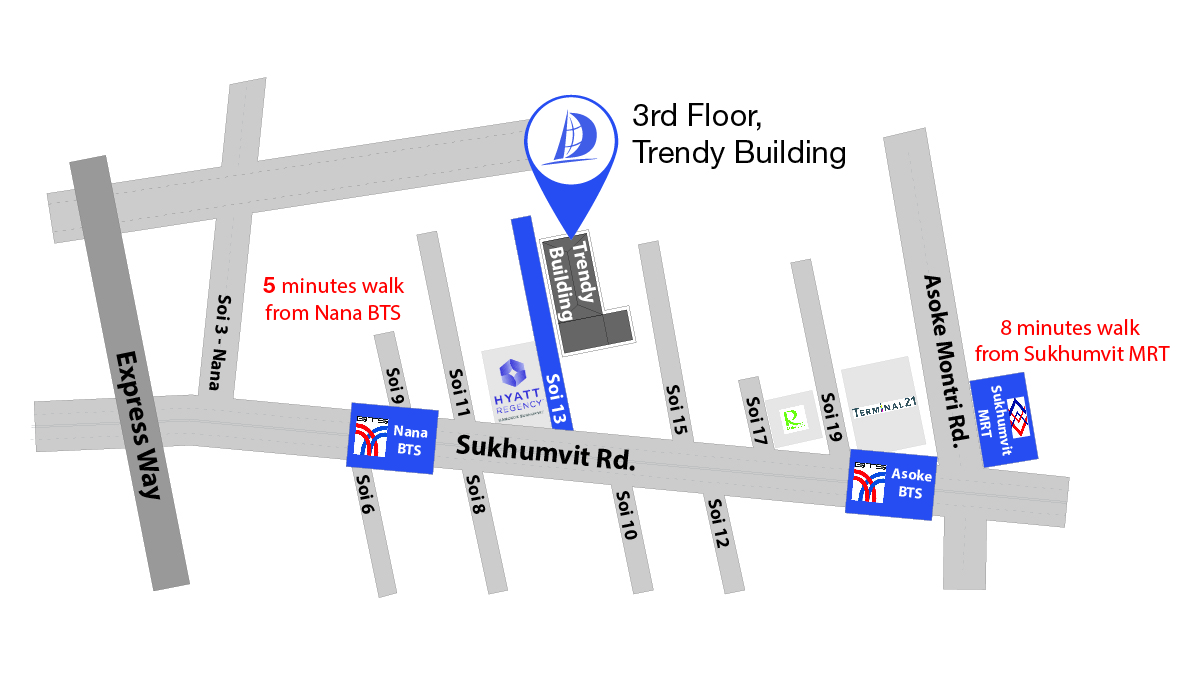Retiring in Thailand? Ditch the Sunset Selfies. Learn Thai, Get an ED Visa, and Actually Live Here.
Thailand doesn’t ask for your attention. It grabs you by the senses. Step off the plane, and it’s all there: the sensation of fish sauce, the chaos of motorbikes, and the friendly strangers who say ‘sawasdee’ and quickly feel like neighbors as you stroll down the street. For retirees, the question isn’t where to place your bags. It’s how to dive headfirst into a life that’s a uniquely unforgettable experience, spicy, sweaty, and simply like no other.
There’s a hard truth: no matter how many beaches have been visited or how many bowls of tom yum have been devoured, Thailand remains partially hidden to those who don’t speak the language. The best way to peel back those layers is to immerse in Thai, ideally for at least eight months, under an Education Visa (ED visa). This article explains why a slower approach can make retiring in Thailand a reality.
The ED Visa: Your Ticket to the Thailand Tourists Never See

What the ED Visa Actually Does
Let’s cut through the jargon: an ED visa lets you stay in Thailand long-term, not as another sunburned tourist, but as someone who’s actually trying to get this place. Think of it as a backstage pass to the Thai language. No need to scramble for retirement visa cash reserves upfront. Just show up, learn, and let the rest unfold. More than a legal document, it becomes a permit to get lost in hidden alleyways, strike up basic conversations in fresh markets, and even negotiate rent with local landlords in Thai, all while staying firmly on the right side of the law.
Why Not Go Straight for a Retirement Visa?
Retirement visas demand you jump through hoops. ED visas? You just have to show up… and maybe learn to read a menu without pointing. The retirement visa in Thailand often requires specific age limits, health insurance, and proof of substantial finances in a Thai bank. For those who are still straddling the line between “Yes, this is my future home” and “Is this really the right place?”, diving headfirst might feel premature.
The ED visa isn’t a loophole. It’s a lifeline. Rather than ticking off boxes on an immigration form, consider taking the scenic route. Learn the language, explore the culture, and decide if this country aligns with personal goals. Think of it as a slow-cooked stew rather than a microwaved meal. Patience deepens the flavor.
When Language Unlocks Culture
The Daily Victories of Speaking Thai
Forget bridges. Language is a crowbar. Crack open a rusty สวัสดีครับ (sawàtdii kráp) at the morning market, and watch the woman selling mango sticky rice grin like you just handed her a lottery ticket. Use a bit of Thai to order street food, like ข้าวผัดไก่ ไม่ใส่ผงชูรส (kâaopàt gài, mâi sài pǒng-chuurót), which means fried rice with chicken, don’t add MSG, and the experience shifts from a transaction to a shared moment.
Retirement often grants the gift of time, and there’s no better way to use that time than breaking cultural barriers. Studying Thai isn’t about becoming a linguistics scholar; it’s about picking up enough vocabulary and phrases to move through daily life with more confidence. Attempting the tones and deciphering the script transforms routine errands into small adventures.
Mai Pen Rai and Other Survival Tips: How Thais Actually Think
Thailand brims with customs that revolve around respect, politeness, and a concept often expressed as ไม่เป็นไร (mâi-bpenrai) meaning “Never mind” or “It’s all good.” Without a grasp of the language, the subtlety of these cultural norms might go unnoticed. By learning how Thais speak and why they use certain phrases, the deeper logic of everyday interactions reveals itself.
That knowledge is invaluable for a retiree. Negotiating a lease, interacting with local officials, or simply showing respect in a neighborhood temple become more natural with at least a basic command of Thai. Instead of feeling like a perpetual outsider, a retiree can become part of the local community.
Why Learning Thai Tones is Cheaper (and More Fun) Than Dementia Meds
Retirement doesn’t mean the end of learning. Taking on Thai, a tonal language with its own script, exercises parts of the brain that might have been on autopilot for decades. Studying new scripts, memorizing phrases, and mastering tones will stimulate your brain. For those who plan to make Thailand home, there’s something gratifying about thriving mentally while settling into a laid-back environment.
Testing the Thai Waters: The 8-Month Experiment

Why 8 Months?
8 months. That’s how long it takes for the postcard-perfect sunsets to fade into something real, like realizing your favorite street vendor’s name is Somchai, not ‘Pad Thai Guy,’ or that monsoon season means your socks will never fully dry. After 8 months, the best street vendor in the neighborhood becomes a regular spot. Weekend excursions to beach towns or mountain retreats shift from must-see attractions to personal getaways.
Those who stay for 8 months under an ED visa quickly learn if Thailand is truly suitable for long-term life. Is the tropical climate a blessing or a challenge? Can the occasional hiccups in infrastructure be accepted with a shrug, or do they turn into daily frustrations? An ED visa is the sweet spot when deciding whether to make Thailand your permanent home.
Real-World Budget Testing
Let’s talk money. Yes, Thailand’s cheap, until you realize you’ve spent half your pension on 3am mango sticky rice binges and tuk-tuk drivers who ‘accidentally’ take the scenic route. Rent, transportation, groceries, and entertainment costs vary widely between Bangkok, Chiang Mai, Pattaya, Hua Hin, and the islands.
Under an ED visa, retirees can track their actual monthly spending. It’s one thing to estimate living expenses by reading guides or blog posts. It’s another to feel the pinch or ease of each baht spent over a realistic timeline. By the end of eight months, a clear picture emerges, one that helps finalize the retirement decision.
Building a Local Network
Language schools attract more than just backpackers. They often become melting pots where retirees become friends with businesspeople, digital nomads, and even aspiring Muay Thai fighters. Studying Thai together helps create bonds between people who might otherwise not meet one another.
This network can evolve into a reliable support system. Need advice on local property investments or the best hospital in town? Chances are someone in class knows a trustworthy agent or has had experience dealing with medical appointments. By the time an ED visa approaches expiry, friendships forged in study halls might feel like an extended family. That kind of support is priceless for anyone leaving their home country.
Thai Visa Rules: A Survival Guide for the Jaded and Jet-Lagged
Understanding the Visa Labyrinth
It’s no secret that the Thai immigration system can be complex. Each visa type comes with its own labyrinth of requirements, documents, and renewal processes. Under an ED visa, a language school handles much of the legwork, supplying the necessary paperwork and guidance.
That support is crucial for first-timers. Getting lost in translation or misunderstanding a regulation can become expensive or even lead to overstay issues. With the school’s help, the path is smoothed out, leaving more time to practice vocabulary or indulge in a mango sticky rice quest.
Paving the Way to a Retirement Visa
Eventually, the retirement visa awaits. After experiencing real life in Thailand under the ED visa, the next step becomes clearer. Those who move on to a retirement visa carry valuable insights for navigating local bureaucracy. They know where to get documents translated, how to open a Thai bank account, and which insurance policies are best.
Language fluency, even at a moderate level, boosts confidence during official processes. Immigration officers appreciate efforts to speak Thai. While it won’t magically eliminate regulations, it can lighten the mood and build goodwill, making the entire process more seamless.
Digging Deeper into Thai Culture

Beyond the Tourist Highlights
Thailand’s true soul won’t be found on Instagram or a website with someone’s bucket list. It’s in the old lady who yells at you for mispronouncing ข้าวซอย (kâao sɔɔi) then feeds you until you can’t move. It’s home to centuries-old traditions, lesser-known festivals, and hidden culinary gems that never make it onto the average travel itinerary. Diving into the local culture often starts in the classroom, where teachers share insights about festivals like Loy Krathong or Songkran. They offer a behind-the-scenes perspective on how and why Thais celebrate.
Then comes the chance to experience these events firsthand, crafting a floating krathong or joining a water fight with the neighborhood kids. Communication is key. Speaking a bit of Thai can transform a shy smile into a genuine conversation about the meaning behind these traditions.
Taking the Road Less Traveled
One of the simplest joys is hopping on a slow train through rural provinces where tourism remains minimal. Comfort with basic Thai phrases opens doors to local homestays, offbeat cafés, and markets where fresh produce is sold at prices far below city rates.
In these quieter corners, everyday life retains a more traditional pace. Curious locals might strike up a conversation, and those with the right words to respond will discover an unmatched warmth. This sense of authentic connection is what often cements Thailand as a retirement destination in the hearts of foreign visitors.
The Reciprocity of Respect
Here’s the secret: Thais don’t expect fluency. They want to see you try. Mangle the tones in ข้าวซอย (kâao sɔɔi) all you want. The cook will cringe, laugh, then toss an extra fried shallot mountain on your bowl like a gold star for effort. Thais are famously gracious toward those who try to engage on their terms. That respect returns in countless ways, like extra care in a crowded restaurant, a friendly wave from a familiar face at the local market, or a neighborhood invitation to a wedding celebration.
Over time, small moments accumulate into a sense of belonging. The difference between being a mere tourist and becoming a welcomed resident hinges on the willingness to embrace the culture, starting with the language.
Staying Alive: Hospitals, Happiness, and Not Losing Your Mind
Healthcare and Communication
Thailand’s healthcare system is robust, offering both private and public facilities. Costs tend to be lower than in Western countries, but communication is critical. Speaking enough Thai to describe symptoms or fill out forms can prevent misunderstandings.
For more serious cases, bilingual staff might step in, but being able to handle small medical interactions, like pharmacy consultations or routine checkups, grants autonomy. For retirees who take daily medications or need frequent consultations, the value of being understood and being able to understand in return can’t be overstated.
Emotional Well-Being
Relocating after having decades of the same routine can be exhilarating yet challenging. Language study offers a purposeful activity and a natural community. Classes serve as an anchor in unfamiliar waters, ensuring that each day has structure, goals, and social interactions.
Engaging in new learning is also a potent remedy against isolation. Retirement doesn’t have to mean fading into the background. In Thailand, it can mean discovering a new rhythm of life that’s both stimulating and serene.
Why Duke Language School Is the Perfect Starting Point

Tailored Thai Courses
At Duke, we’re not here to drown you in textbooks. Want to haggle over a tuk-tuk fare or politely speak your mind when the mangoes are overpriced? That’s your homework. It’s not about rote memorization. It’s about stepping outside the classroom with practical phrases ready to be tested on the streets of Bangkok. Each lesson is built around scenarios retirees will actually face, like paying bills, chatting with neighbors, or negotiating a fair market price.
Comprehensive ED Visa Support
Navigating visa paperwork alone can be overwhelming. Duke Language School assists in handling the application process, drafting the necessary documents, and ensuring everything complies with government regulations. This frees up your time to study, explore, or simply kick back at your favorite café.
Regular check-ins and attendance are also managed by our staff. Compliance is essential, so having an experienced partner streamlines the process and eliminates unnecessary stress.
Community and Camaraderie
Duke Language School fosters a sense of belonging from day one. Students from various backgrounds converge for a shared goal: to unlock Thailand through language. Friendships spark over shared struggles with tones or the realization that “ไม ใหม่ ไม่ มั้ย ไหม (mai mài mâi mái mǎi)” is an actual phrase in Thai with multiple meanings.
In a setting where everyone is adapting to a new culture, camaraderie forms quickly. This network extends beyond the classroom, providing social events, cultural events, and spontaneous meetups that turn Bangkok into a place that feels more like home.
ED Visa 101: Paperwork, Baht, and Not Getting Screwed

Required Documents:
Valid Passport: Preferably valid for at least one year to avoid complications.
Enrollment at a Recognized School: An official acceptance letter is crucial for the visa application.
Financial Proof: Requirements can differ, so checking with the Thai Embassy or Consulate is wise.
School Documentation: Duke Language School provides paperwork verifying a genuine course of study.
Staying on the Right Side of Immigration
Thai immigration authorities expect ED visa holders to attend classes regularly. Absenteeism can lead to complications or even visa cancellation. Duke Language School keeps track of attendance and supports extensions by confirming active course participation.
Regular 90-day reports will be needed for long stays. This involves reporting current addresses to Thai immigration. Again, the school can offer guidance to ensure compliance.
Setting a Budget
Tuition: 36,000 baht buys you 8 months of classes, roughly the cost of 3 nights at a ‘luxury’ resort in Phuket (read: overpriced pool and a minibar stocked with warm Singha). Pro tip: Skip the resort. The real luxury is arguing over durian prices without needing Google Translate.
Visa Fees: 2,000 baht for the ED visa (initial application) and 1,900 baht per visa extension.
Living Expenses: Factor in rent, utilities, food, transportation, and entertainment. Your actual monthly expenses will become clearer after 8 months of living in Bangkok.
The Final Word: Why Retiring Here Means Trading Comfort for Chaos (And You’ll Love It)
Let’s be real: retiring here isn’t about sipping mai tais while someone else does the heavy lifting. It’s about sweating through your shirt at a street cart at 7am, bantering with a grandma who insists you need a second helping. It can be a meaningful and transformative chapter of life. The ED visa provides a practical way to test that dream, blending cultural immersion with an official program.
Learning Thai isn’t a side note. It’s the main script for those who want the full experience. It grants access to local conversations, fosters respect from neighbors, and makes the difference between merely existing in Thailand and genuinely living there.
At Duke Language School, the philosophy is simple: learning Thai should be both useful and enjoyable. Success isn’t measured by textbooks read or grammar rules memorized, but by the real-world confidence that blooms, whether in a crowded market or during official visa processes. This journey sets the stage for a well-rounded retirement, one that can be fully savored, from the fiery depths of som tam to the heartfelt traditions woven into everyday Thai life.
If you’re ready to trade sunscreen for textbooks and small talk for street food slang, Duke’s got your back. We won’t coddle you, but we will make sure you know how to order your noodles without pointing. Questions about courses, visa support, or living in Bangkok are always welcome. It’s an open invitation to learn the language of a country that’s been captivating travelers for decades, and to uncover a life that resonates on a deeper level, one phrase at a time.
For inquiries about our ED visa program or to learn more about studying Thai at Duke Language School in Bangkok, visit our website at www.dukelanguage.com or reach out directly at +668-2444-1595.



